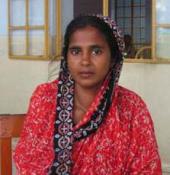This story was written in 2006, under the ACQUIRE Project.
Kareema is 30 years old. She has traveled from another district to the Kumudini Hospital, in central Bangladesh, because she heard they are doing fistula repair surgeries at the facility. Kumudini is one of three private-sector hospitals in Bangladesh where the ACQUIRE Project is supporting fistula prevention, management, and repair.

Kareema got married when she was 15 and became pregnant when she was 18. Her delivery was difficult; she was in labor for two days at home, under the care of a traditional birth attendant. She was eventually taken to a local hospital, where she delivered, but her child did not survive. Because of the long labor, she developed a fistula, or a hole between her vagina and her bladder.
Kareema’s story is not unlike those of many women who come to the hospital for fistula repair. An estimated 90% of women in Bangladesh deliver at home, and as a result they are prone to developing obstetric fistula, the result of prolonged and obstructed labor. When women deliver at home, often without even skilled birth attendants, they lack the medical attention and services (such as a cesarean section) that could prevent a fistula from occurring. Women who do develop fistula are left incontinent and often susceptible to social stigma and shame.
Kareema has suffered from both the physical and social ramifications of fistula for many years. Her husband is an agricultural day laborer. She says he is her “biggest strength.” But she says her in-laws do not treat her well; the stigma she faces from fistula has caused her to miss out on many social occasions and events.
After developing a fistula following her first delivery, Kareema was advised by her doctor not to become pregnant again. Taking her doctor’s advice, she used contraception after this. But after several years, she became pregnant. Again, she was in labor for several days at home, before being taken to the hospital. At the facility, they performed a cesarean section, but unfortunately the baby did not survive. This time, she had to stay at the hospital for more than one month to recover.
Following this pregnancy, she took the pill for four years, but then stopped. She then became pregnant again. But there was a faint silver lining for Kareema this time around. For her delivery, her husband took her straight to the hospital. Fortunately, the baby boy survived, and he is now 9 years old. Kareema’s husband recently decided to get a vasectomy. As for Kareema, there is no guarantee that her fistula repair surgery will be 100% successful, but she is waiting and hopeful.


